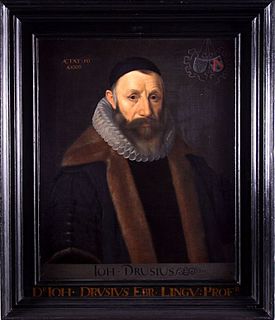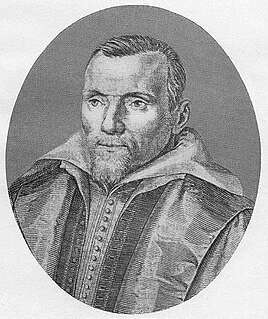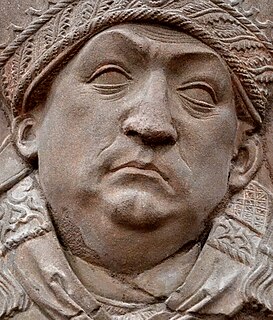 W
WRodolphus Agricola was a pre-Erasmian humanist of the Northern Low Countries, famous for his supple Latin and distinct ability to interpret Greek. He is believed to be the first individual north of the Alps to remain capable of utilizing the language. Agricola was an educator, musician, builder of the church organ, a poet in Latin in addition to the vernacular, a diplomat, a sportsman of sorts (boxing) and a Hebrew scholar towards the end of his life. Today, he is best known as the author of De inventione dialectica, the father of Northern European humanism and as a zealous anti-scholastic in the late fifteenth century.
 W
WAlardus or Alaard of Amsterdam (1491–1544) was a Dutch humanist scholar, known as an editor of Rodolphus Agricola and Erasmus.
 W
WCaspar Barlaeus was a Dutch polymath and Renaissance humanist, a theologian, poet, and historian.
 W
WDominicus Baudius, a latinised form of Dominique Baudier, was a French Neo-Latin poet, scholar and historian. From 1603 to 1613 he was a teacher at the University of Leiden.
 W
WHerman Boerhaave was a Dutch botanist, chemist, Christian humanist, and physician of European fame. He is regarded as the founder of clinical teaching and of the modern academic hospital and is sometimes referred to as "the father of physiology," along with Venetian physician Santorio Santorio (1561–1636). Boerhaave introduced the quantitative approach into medicine, along with his pupil Albrecht von Haller (1708–1777) and is best known for demonstrating the relation of symptoms to lesions. He was the first to isolate the chemical urea from urine. He was the first physician to put thermometer measurements to clinical practice. His motto was Simplex sigillum veri: 'Simplicity is the sign of the truth'. He is often hailed as the "Dutch Hippocrates".
 W
WHieronymus van Busleyden was a patron of learning and a humanist from the Habsburg Netherlands. His name is usually partially Latinized in English, and can also appear as Hieronymus Busleyden or fully Latinized as Hieronymus Buslidius.
 W
WDirck Volckertszoon Coornhert, also known as Theodore Cornhert, was a Dutch writer, philosopher, translator, politician, theologian and artist. Coornhert is often considered the Father of Dutch Renaissance scholarship.
 W
WPetrus Cunaeus was the pen name of the Dutch Christian scholar Peter van der Kun. His book The Hebrew Republic is considered "the most powerful statement of republican theory in the early years of the Dutch Republic."
 W
WJanus Dousa, Lord of Noordwyck, was a Dutch statesman, jurist, historian, poet and philologist, and the first Librarian of Leiden University Library.
 W
WJohannes van den Driesche [or Drusius] was a Flemish Protestant divine, distinguished specially as an Orientalist, Christian Hebraist and exegete.
 W
WDesiderius Erasmus Roterodamus was a Dutch philosopher and Christian scholar who is widely considered to have been one of the greatest scholars of the northern Renaissance. As a Catholic priest, Erasmus was an important figure in classical scholarship who wrote in a pure Latin style. Among humanists he enjoyed the sobriquet "Prince of the Humanists", and has been called "the crowning glory of the Christian humanists". Using humanist techniques for working on texts, he prepared important new Latin and Greek editions of the New Testament, which raised questions that would be influential in the Protestant Reformation and Catholic Counter-Reformation. He also wrote On Free Will, In Praise of Folly, Handbook of a Christian Knight, On Civility in Children, Copia: Foundations of the Abundant Style, Julius Exclusus, and many other works.
 W
WGerardus Geldenhouwer was a Dutch historian and Protestant reformer.
 W
WJohannes Goropius Becanus, born Jan Gerartsen, was a Dutch physician, linguist, and humanist.
 W
WGerard Groote, otherwise Gerrit or Gerhard Groet, in Latin Gerardus Magnus, was a Dutch Roman Catholic deacon, who was a popular preacher and the founder of the Brethren of the Common Life. He was a key figure in the Devotio Moderna movement.
 W
WHugo Grotius, also known as Huig de Groot or Hugo de Groot, was a Dutch humanist, diplomat, lawyer, theologian, jurist, poet and playwright.
 W
WDaniel Heinsius was one of the most famous scholars of the Dutch Renaissance.
 W
WHadrianus Junius (1511–1575), also known as Adriaen de Jonghe, was a Dutch physician, classical scholar, translator, lexicographer, antiquarian, historiographer, emblematist, school rector, and Latin poet.
 W
WGeorgius Macropedius was a Dutch humanist, schoolmaster and "the greatest Latin playwright of the 16th century."
 W
WAdolf van Meetkercke (1528–1591) was a Flemish diplomat and humanist.
 W
WErycius Puteanus was a humanist and philologist from the Low Countries.
 W
WTheodorus Schrevelius was a Dutch Golden Age writer and poet.
 W
WRutgerus Sycamber or Roger of Venray was a humanist, music theorist, and a prolific but little-published writer. He was a canon regular of the Augustinian Order based for most of his life at the monastery of Hagen near Worms.
 W
WJustus Velsius, Haganus, or Joost Welsens in Dutch, was a Dutch humanist, physician, and mathematician.
 W
WGerrit Janszoon Vos, often known by his Latin name Gerardus Vossius, was a Dutch classical scholar and theologian.